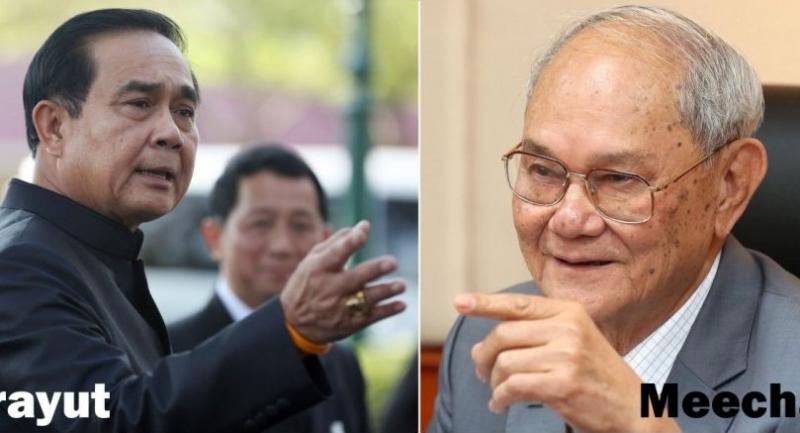
Prayut condemns current reporting as biased; Meechai says draft threatens press freedom
THE CONTROVERSIAL media reform bill proposed by the media panel of the National Reform Steering Assembly (NRSA) could be deemed to violate the referendum-endorsed constitution, charter drafter chairman Meechai Ruchupan said yesterday.
In principle, any laws issued must comply with the constitution and its principles, the chairman of Constitution Drafting Commission (CDC) said.
Meechai’s views contradicted those of Prime Minister Gen Prayut Chan-o-cha, who said yesterday the bill was needed to set moral standards for the media and to ensure less biased content produced by the media.
“In this country, all professions will need to be standardised and trained. No one can be indulgent, Prayut said at his weekly news briefing.
“It appears that [media] organisations can’t really regulate themselves,” the premier said. “We don’t want to obstruct anything. We just want to make sure that the media will adhere to codes of conduct and people will receive rounded news, not biased like how it is now.”
“Current reporting doesn’t let the government and civil servants work smoothly and that’s a problem,” he added.
Prayut’s remarks countered concerns raised by 30 media organisations that the bill could restrict press freedom rather than protect it as its proponents have claimed.
Media advocates have expressed concern that the so-called “media professional council”, consisting of 13 members including four permanent secretaries from the Finance, Culture and Digital Economy ministries as plus the PM’s Office, would allow authorities to politically influence media affairs.
According to the draft bill, the council would be authorised to dictate media regulations, codes of conduct, and issue or revoke media licences, with the bill suggesting that the licensing provision would be essential for journalistic practices.
In countering those concerns, Prayut said the four permanent secretaries would not be able to outweigh the other council members, who would be chosen from various fields, nor force any particular consensus.
Media reform is one of 11 reform agendas that the government is attempting to simultaneously push forward, he added.
“Every sector, including the government, will have to reform itself to boost trust and lessen suspicion,” he said.
“Don’t be too suspicious that [the media] will be forcefully closed or anything like that. Would the council be allowed to do that? There’s a legal way and the government can’t interfere,” he added.
However, CDC head Meechai said the charter that passed the referendum in August last year stipulated that the press must have professional freedom, a right that must be protected. He added that the new charter also promoted the principle of media self-regulation.
“If other professions are allowed to regulate the media, it could lead to interference by other professions,” he said.
Meechai suggested that the reform panel and media discuss points of concern and set up a subcommittee composed of media members to address problems.
“Journalism is a special profession. Outsiders may not well understand the profession or process of work,” he added.
Another charter drafter, Chatchai Na Chiangmai, said media organisations should submit a petition to the Constitutional Court calling for a review of the draft bill.
“Authorities getting involved in the professional council could have a hidden agenda to control media,” he said.
Media organisations nationwide issued a statement on Sunday against the controversial bill, announcing plans to submit an open letter to members of the NRSA via the vice chairman of the NRSA, Alongkorn Polaboot, to voice their opposition tomorrow.


